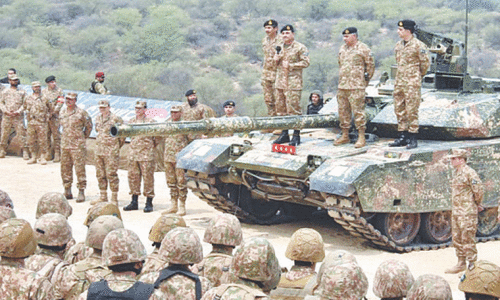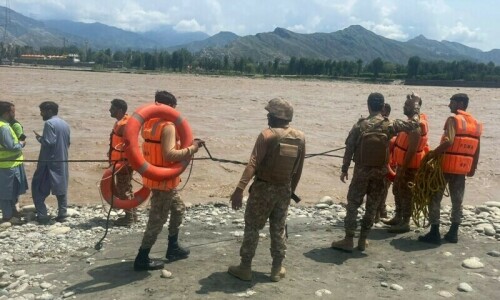Prime Minister Shehbaz Sharif on Friday urged Saudi Arabia and other Gulf allies to impress upon India to de-escalate and defuse tensions in South Asia in the wake of plummeting ties between the two countries following last week’s militant attack in occupied Kashmir, the Associated Press of Pakistan reported.
The April 22 attack in occupied Kashmir’s Pahalgam killed 26 people, mostly tourists, marking one of the deadliest assaults on civilians in the region since 2000. India has implied cross-border links without evidence, while Pakistan’s civilian and military leadership have rejected the accusation and called for a neutral probe.
As tensions continue to simmer in light of the attack, Pakistan on Thursday had engaged a host of friendly nations, including China, to seek their support for de-escalation measures between the nuclear states and to take them into confidence regarding the ‘weaponisation’ of the Indus Waters Treaty by India.
A press release issued by the Prime Minister’s Office (PMO) said PM Shehbaz continued his engagements with other countries over the current political climate in the region.
“He urged brotherly countries, including Saudi Arabia, to put pressure on India to reduce tensions in the region. He reiterated Pakistan’s desire for peace and stability in South Asia,” the PMO statement said of his meeting with Saudi Ambassador to Pakistan Nawaf bin Saeed Al-Maliki.
The premier made a similar request in a separate meeting with Ambassador of the United Arab Emirates to Pakistan Hamad Obaid Ibrahim Salem Al-Zaabi. PM Shehbaz also met Ambassador of the State of Kuwait Nasser Abdulrahman Jasser.
While sharing Pakistan’s stance with the ambassadors on the recent situation in South Asia following the Pahalgam incident, the prime minister said that Pakistan condemned terrorism in all its forms and manifestations.
“It had rendered great sacrifices in its counter-terrorism efforts over the years. This was done not only to protect Pakistan but the entire world,” the prime minister said.
He outrightly rejected “baseless Indian accusations” linking Pakistan to the Pahalgam incident without any evidence and reiterated his call for a transparent and neutral international investigation into the incident.
Emphasising the government’s complete focus on consolidating the hard-earned economic gains of the past 15 months, the prime minister said it was “inconceivable for Pakistan to act irresponsibly to jeopardise its achievements and derail the country from the path of economic progress” or take such an action that could imperil regional peace and security.
The prime minister thanked the Saudi leadership and people for always standing in solidarity with Pakistan through thick and thin.
The Saudi ambassador thanked the prime minister for sharing his views on this important issue and said that Saudi Arabia wanted to work with Pakistan for peace and security in the region.
During the meeting with the UAE ambassador, the prime minister thanked the UAE for its unwavering support to Pakistan, saying it “bore testament to the historic, deep-rooted, fraternal ties between the two countries”.
The UAE ambassador thanked PM Shehbaz for sharing Pakistan’s position and said that the UAE would work closely with Pakistan to maintain regional peace and security.
PM Shehbaz shared that Pakistan was reaching out to other friendly countries to present its position on the current crisis.
During the meeting with the Kuwait ambassador, the prime minister noted the strong, historic, brotherly relations between Kuwait and Pakistan.
The premier said that he looked forward to the visit of Crown Prince Sheikh Sabah Al-Khaled Al-Hamad Al-Mubarak Al-Sabah at the earliest possible time.
The Kuwaiti ambassador thanked PM Shehbaz for sharing Pakistan’s position and affirmed that Kuwait shared Pakistan’s vision for regional peace and security.
PM Shehbaz had contacted Qatar’s ruler Sheikh Tamim bin Hamad Al-Thani and Chinese Ambassador Jiang Zaidong a day ago regarding the situation.
The Gulf states — traditionally viewed as friendly toward India due to strong economic ties and the presence of a large Indian diaspora — have chosen a measured, noncommittal approach amid the tensions. Saudi Arabia, the UAE and Qatar have all issued statements emphasising de-escalation and peaceful resolution.
These responses were less about backing India’s position and more about protecting their own strategic interests.
Meanwhile, Deputy PM and Foreign Minister Ishaq Dar also continued his engagements and held a telephonic conversation with Panama FM Javier Eduardo Martinze-Acha Vasquez.
Dar briefed him on the current regional situation, including India’s “inflammatory propaganda and its illegal unilateral actions against Pakistan”, including holding in abeyance the Indus Waters Treaty in a clear violation of international law, according to a Foreign Office press release.
FM Vasquez emphasised that both sides should exercise restraint.
Being non-permanent members of the United Nations Security Council, the two sides reaffirmed their commitment to international peace and security.
Dar also held a similar talk with Denmark FM Lars Løkke Rasmussen, briefing him on the evolving regional situation and the measures taken by the National Security Committee in response to India’s actions.
He strongly rejected India’s decision to hold the Indus Waters Treaty in abeyance, saying it was a clear violation of treaty provisions and international law.
Dar underscored Pakistan’s resolve to safeguard its sovereignty and national interests, while contributing to regional peace and security.
Expressing concern over the escalation, FM Rasmussen emphasised the importance of both sides exercising restraint.
“The two leaders agreed to maintain close contact on regional and global developments, particularly at the UNSC, as non-permanent members.
“They also agreed to strengthen bilateral cooperation, especially in areas of economy and investment, as well as promoting high-level exchanges,” the FO said.














































